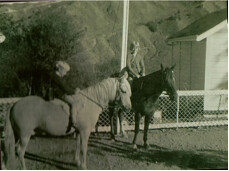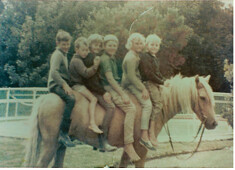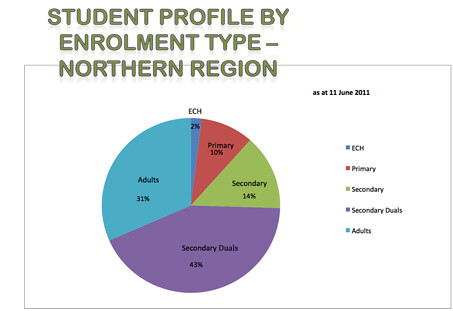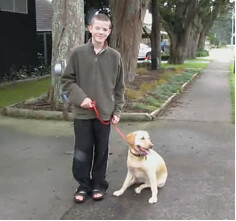Hi to everyone on this freezing week in August with snow everywhere – even a flurry in Auckland! Thank you Hazel, for inviting me to blog.
I am currently working at Te Aho o Te Kura Pounamu – The Correspondence School as the Te Ara Hou Team Leader for the Northern Region for years 7 to 10.
 Janey and her brother Andy riding to school 1967 |  Janey on her first pony, Sugar with friends |
After leaving school I completed my B. Ed. at Massey University managing to complete a paper in equestrienne and a special paper in “teaching disabled children to ride” before travelling overseas. My passion has always been sport, teaching and building relationships with both people and animals.
After being married and having three children I taught in Feilding, Taupo and various schools in the Waikato plus 18 years at Hamilton Girls’ High school while gaining my MSocSci and later a Diploma in School Principalship at the University of Waikato. As part of the senior management team I became very interested in online learning and teaching. I worked with Dr Paul Keown and Professor Lex Chalmers setting up on line communities especially for rural teachers in country schools.
In 2010 I was fortunate to be awarded a Mathematics, Science and Technology Fellowship with the Royal Society at the University of Waikato where I investigated the effectiveness of a blended Community of Practice for teachers of Geography in isolated schools. The key to this community was relationship building. There are presently 102 teachers on this Isolated to Connected Community of Practice site. The September blogger, Dr Paul Keown will talk about this site next month on this superb site of Hazel’s.
Hazel Owen and Eddie Reisch were extremely helpful to me in 2010 with helping me with links to other online communities. Hazel in particular was always there to help me with “Ning” related problems.
In 2011 I took on a new challenge as I hoped to be able to help rural and isolated children. I am thoroughly enjoying my new position at Te Aho o Te Kura Pounamu – The Correspondence School as a Team leader for the Northern region. I am part of the He Kakano programme where my first goal is to encourage my team to build strong relationships especially with our Maori students and whanau. My second goal is to enable our students and their whanau to become more literate. Recently I spoke at the Literacy Aotearoa Conference with Robert Blucher (Northern regional manager) where we managed to gain much interest from Literacy Aotearoa which we are finding really exciting.
Background about Te Aho o Te Kura Pounamu:
What astounded me when I first started at Te Kura was the fact that the school was so large with approximately 25,000 students making it the largest in New Zealand in addition those geographically isolated make up a rather a small percentage of the roll. It is interesting to note that most students are enrolled due to exclusion, expulsion, alienation, psychological and psycho-social reasons (58%). All types of isolation including geographic isolation make up only 13% of our roll (see Table 2). I was surprised that dual students comprise 43% of the roll and adults make up 31% (see Table 3).Table 1 below showing enrolment for Te Kura increasing 2007 to 2010 as well as photographs of our students at various Northland locations
Cumulative enrolments | 2007 | 2008 | 2009 | 2010 |
| Total | 22,923 | 22,802 | 24,503 | 26,135 |
| Equivalent full-time students | 7,138 | 7,845 | 7,845 | 8,167 |
 |  |  |  |
Table 3
Goal one: Relationships
Max and his mother have given me permission to tell our story about “Relationships”.I was speaking to Max’s Mum and I said, “Can I please speak to Max?”
“No, I’m afraid he won’t speak to you or meet with you as he doesn’t trust or like teachers”
After some time I got quite angry – so much for being crazy about building relationships I thought to myself. Think being calm, don’t get irate were my thoughts.
Eventually I said, “Well would he like to meet my dog instead of me then?”
“Yes”, Mum said.
The following weekend Lucy our dog and I met Max at the dog park. We taught him how to lead her and Max fed her 'schmackos' for treats when she came to him. Max didn’t say much except for asking when he could meet Lucy next. As the weeks progressed Max wrote about Lucy, asked about her and did lots of work for me and Lucy. Max was trying very hard but his writing was very poor.
As the weeks progressed our outings with Lucy increased and his writing improved immensely. On the first weekend of last holidays I met Max and his Mum and I said they would be thrilled with Max’s report as every teacher has given him an excellent report with grades of excellence in all his subjects. Mum burst into tears and hugged Max and said, “This will be the first good report he has had. Even when he was five he had a bad report”.
Last time Lucy and I met Max he had a brand new puppy of his own, a smile as wide as can be and the confidence of a successful person.
Max and Lucy
Another student would not meet me however after some time she agreed that I could meet her at her house at 6pm on a Friday, not the 5pm Monday as I had suggested. Once I arrived at her house with homemade chocolate chippies she invited me in and offered a cup of tea. The following week she text me and said she would meet me at the library on a Monday at 5pm. Her sister who is eighteen came along as well. She asked if she could join Te Kura as an adult student and is now enrolled. The exciting part is Aunty who is their caregiver has agreed to be part of the pilot with Literacy Aotearoa. Aunty will have a tutor to help her teach Joanna and then Literacy Aotearoa will help Aunty to become more literate and numerate. It is such a fabulous idea as this is a win - win situation where everyone is gaining greater literacy skills.
Goal Two: To encourage students and their whanau to improve their literacy skills.
Presently my Northland team is involved with a joint venture with Literacy Aoteroa where Literacy Aotearoa Tutors will be working with or students’ supervisors to help with literacy and numeracy skills. The supervisors will first be able to help teach their students with for example, division skills. As time goes by and supervisors grow in confidence it is hoped that the supervisors may also become involved with not only helping their own students but furthering their own literacy and or numeracy skills. It could be that supervisors then enroll in further education and if this happens students will have valuable role models.The trial is with 30 to 40 supervisors in the Northern region of New Zealand with Te Ara Hou teachers of years 7 to 9 taking part in this pilot.
Why do we need this pilot?
- If supervisors cannot understand the instructions in the booklets they cannot provide the key support our students need to succeed.
- When neither supervisor nor student can properly understand the tasks it can lead to frustration, a sense of failure and disengagement.
- If supervisors are given support to increase their level of literacy by Te Kura and Literacy Aotearoa, our students will be able to progress further.
- Literacy Aotearoa gain adult students
- Literacy levels of adults improve
- Student engagement and achievement improves
- Supervisors may become adult students of Te Kura
- Project throughout NZ by 2012
There is a considerable body of research that shows the relationship between parental education and qualification levels and the educational achievement of their children, and that low literacy is frequently intergenerational because parents and whanau with low literacy are less confident and able to support their tamariki. Supporting parental literacy and numeracy for example, the “whanau-school partnerships” that are part of the Ministry of Education’s Ka Hikitia education strategy and which aim to improve the engagement and achievement of Maori students as they transition from primary into secondary school is working well with students of a similar age as those we are conducting our pilot research (Years7 to 10).
A pilot will take place in the Northern region in terms 3 and 4 (with mainly parents of TAH students). Literacy Aotearoa has secured funding for ACE Innovation Pool to fund the pilot and it is hoped this approach will become nationwide in 2012.
The project will be launched by Mike Hollings and Bronwyn Yates, who is Tumuaki of Literacy Aotearoa 19th August.
We have spent time talking with Peter, Bronwyn and Brenda at Literacy Aotearoa Auckland about what supervisors gaining confidence may look like? How can we measure this?
It will be interesting to report back to you with the results of our pilot scheme which begins on August 22nd 2011. The first evaluations will be conducted at the beginning of December this year.









No comments:
Post a Comment